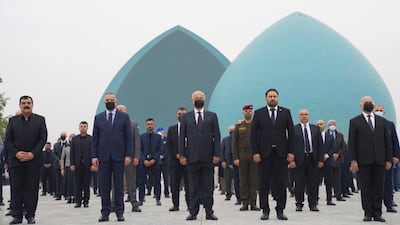For the first time in more than six years, Salim Hasso Khalaf feels some relief.
Mr Khalaf is a member of Iraq's Yazidi religious minority.
On Saturday, he will receive the remains of nine relatives who were among thousands of Yazidis kidnapped and slaughtered by ISIS in 2014.
Iraqi on Thursday held an official funeral ceremony for the first group of 104 Yazidis whose remains were exhumed from mass graves and identified through DNA tests.
The ceremony took place at the Martyr’s Monument in Baghdad.
Caskets wrapped in the Iraqi flag were put on military trucks with flowers.
Members of the Yazidi community will hold another ceremony on Saturday in Sinjar, their ancestral homeland, where the remains will be buried.
"I have a mixture of feelings," Mr Khalaf, 60, told The National from a camp for Internally Displaced People in the northern province of Dohuk, set up after the 2014 ISIS blitz that gave the extremist militants control of nearly one-third of Iraq.
"We are happy to receive the bones of our loved ones, but sad for our loss and the anguish we have gone through all these years."
All the remains are of victims from the village of Kocho, where ISIS captured all of its nearly 1,250 residents in August 2014. At least 500 of them were killed, while nearly 800 men, women and children were taken away. Some of them fled, others were released when military operations against ISIS began, while 400 are still missing.
There are more than 17 mass graves in Kocho alone. Exhumation started in March 2019 and ended in 2020. These remains were supposed to be buried early last year, but the coronavirus outbreak delayed the process.
“Their souls will rest in peace when they are buried in a dignified way in their home town near us and we will be able to visit them and sit by their graves whenever we want,” said Mr Khalaf, who is waiting for the remains of nine of his cousins.
The Yazidis' ancient faith – considered one of the monotheistic religions – has been viewed with suspicion by many who falsely describe its followers as devil-worshippers and apostates.
It is what made them a target for ISIS.
The militants stormed Sinjar and surrounding villages to the east of the northern city of Mosul in early August 2014, seeking to wipe out the community.
Then, the militants separated the young women from their male relatives, selling them into sexual slavery and killing the men.
Mr Khalaf and his family were among those who endured the horrors.
When they heard that ISIS was approaching, they fled Kocho by car in the early morning towards Mount Sinjar, which sheltered thousands of Yazidis.
But they were caught by the militants at a checkpoint near Sinjar and placed inside a two-storey government building with nearly 300 others.
“The first night, they came and examined our faces one by one by torchlight to take the girls aged 15 and above, and days later they started taking those at age 9,” he recalled.
He considers himself lucky as the eldest of his four children was then 7 years old.
“A few days later, they handcuffed us and took in trucks us to another building where one of their leaders with guards holding swords asked us to convert to Islam. We refused,” he said.
They were kept in captivity and moved from place to place until eight months later, when Mr Khalaf was able to flee with his family from the nearby city of Tal Afar with the help of a smuggler.
Kachi Amo Salo is one of only 19 men who survived the ISIS killings in Kocho. He was taken with others to a nearby orchard, but the bullets missed him. He was in Baghdad on Thursday to receive the remains of his brother and four nephews.
“I lost 75 relatives from my extended family,” Mr Salo said. “We have been waiting for this moment for nearly seven years now.”
The Yazidi community in Iraq numbered about 700,000 before 2014, according to their leaders. Many of them are believed to have fled the country, mainly to the West. Those who are still in the country live in camps or have returned to their areas despite the damage their property suffered.
About 2,800 are either still missing or in captivity.
Iraqi officials have said that the process of identifying all the remains will take years. In some cases, it is hard to collect samples from three close living family members needed for DNA tests when all the family members are missing.
Iraq has teamed up with the UN to collect evidence to support criminal investigations and to be presented in criminal trials. But no significant progress has been made in starting these trials.
Amal Clooney, the legal representative of many Yazidi survivors, said on Thursday that while some families will have some closure, "so much more needs to be done for this community, the victims of genocide”.
“There is still no global legal strategy on the prosecution of ISIS crimes," Ms Clooney said. "Investigations led by the UN are an important step; but they have not led to an international trial."


